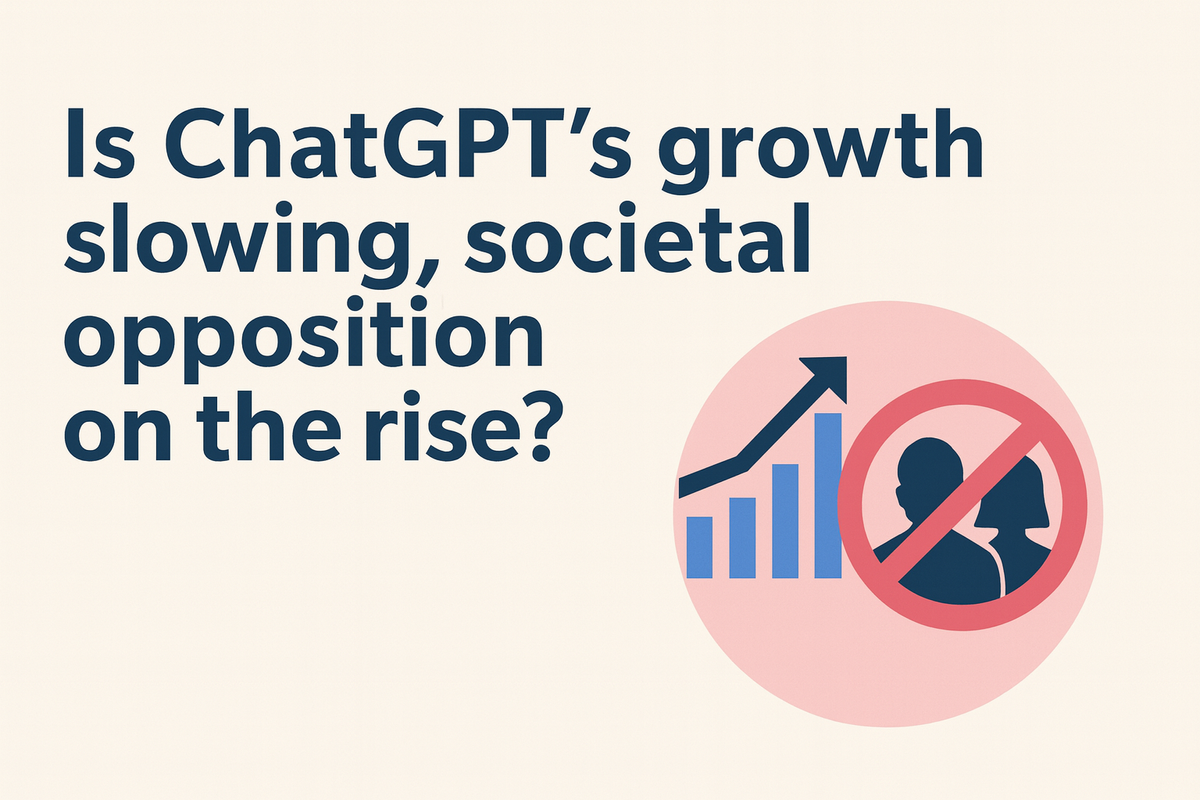AI and Technology

What’s going on with ChatGPT?
👓 3.1 minute read
OpenAI has been caught using deceptive marketing and PR practices - essentially lying, to use an earlier term. Sam Altman has committed to spending more than $1 trillion to build out AI infrastructure, totalling 26 gigawatts of compute capacity from tech companies including Nvidia, AMD, and Oracle with money the company doesn’t have.
The problem? ChatGPT’s growth is stalling, and this likely began around May, 2025.
The mobile app’s usage seems to be at the centre of the problem, with growth having peaked according to Apptopia and TechCrunch. Meanwhile, open resistance to OpenAI and Generative AI in society is on the rise. There’s a cohort or workers, students, coders and creatives who are placing greater value on work that’s untouched by AI – in effect they’re simply saying ‘no’, while citing:
Excessive carbon footprint
Pride in human-made work
Lack of trust in AI output
A desire not to become overly reliant on AI
The fear that AI will erode the ability to think critically
Custom Instructions: The Secret to Smarter, Faster ChatGPT Conversations
👓 3.1 minute read
Custom instructions are one of the most overlooked productivity tools in ChatGPT. They allow users to define who they are, how they work, and what outcomes they expect — saving hours of repetitive prompting and refinement.
By setting clear instructions once, professionals can ensure that every interaction starts from context. For example, an agent can predefine their tone, region, and service type, eliminating the need to repeat that they work in property management or sales. ChatGPT then tailors its output automatically to match the user’s professional voice and objectives.
Used well, custom instructions help ChatGPT ‘sound like you’ rather than like a machine. They ensure consistency across communications, reduce editing time, and create workflows that are easily repeatable.
Try uploading these custom instructions to the ‘personalisation’ area of your account:
What would you like ChatGPT to know about you to provide better responses?I am a licensed real estate agent within the First National Real Estate network. My role involves property marketing, client communication and community engagement. All content must reflect First National’s reputation for professionalism, trust and integrity. I operate under Australian property legislation, so information must align with state and territory real estate laws. Avoid legal or financial advice and ensure all material suits publication on professional platforms or marketing channels.
How would you like ChatGPT to respond?Write in concise, professional UK English using short, active sentences. Maintain a factual, courteous and confident tone. Avoid hype, clichés or exaggeration. Use single quotation marks, spaced en dashes (–). Never use the words accordingly, exemplifies, heartfelt, unwavering or impactful. Support the property sector’s interests while remaining apolitical.
When creating marketing images:
- Use landscape format
- Apply a Pantone 541 strap across the base (≈12% height)
- Place the white First National logo bottom right
- Position the headline top left in white with a subtle Pantone 432 shadow
AI and ethics: Why the future of real estate depends on both
👓 3.1 minute read
Artificial intelligence is now inseparable from the daily operations of modern real estate. From drafting property descriptions to summarising market data, AI has become the industry’s silent assistant — fast, efficient and increasingly intelligent. But speed and scale are not substitutes for sound judgement. As AI shapes the way the public discovers, evaluates and interacts with agents, the profession faces a defining test: how to innovate without losing sight of integrity, fairness and trust.
At First National Real Estate, we’ve chosen a measured path. For years, we’ve worked side by side with offices to help them build and maintain strong digital reputations — not through shortcuts, but through consistent, transparent engagement with customers. Each Google review, response and update to a business profile has been handled deliberately, with both compliance and authenticity in mind. As a result, more than 70 per cent of our offices now rank within the top three Google search positions in their local markets — a result born of diligence, not automation.
Building trust the hard way
Our success has come from understanding what consumers and search algorithms both value: accurate information, prompt replies and genuine empathy. Online reputation is not a campaign; it’s a culture. Every review, whether glowing or unfair, is an opportunity to demonstrate the professionalism of our network and the respect we show our clients. That ethos cannot be outsourced to an algorithm.
The limits of automation in reputation management
AI is undeniably useful as a legal reference point. It can help interpret state legislation, identify breaches of defamation law, or assist in drafting neutral responses that meet compliance standards. Used properly, it keeps tone measured and ensures replies avoid statements that could escalate a dispute.
However, AI remains a poor judge of strategy in the complex world of online reputation. It cannot read intent, assess personality, or understand the interpersonal subtleties that drive a reviewer’s behaviour. Where AI often fails is in the art of persuasion — particularly when crafting responses that encourage a misleading or deceptive reviewer to voluntarily remove or amend their post.
Experience shows that empathy, timing and tone are critical. The right reply can diffuse conflict and invite reflection, while a technically perfect but emotionally flat AI-generated response can entrench hostility. That’s why our network continues to rely on human oversight — guided by policy, not replaced by it.
Ethics as a competitive advantage
In a marketplace where consumer scepticism is high, ethical behaviour is not merely compliance; it’s brand equity. The agencies that will thrive are those that disclose how they use technology, check facts before publication, and apply clear internal standards for data accuracy and privacy.
AI tools must serve to amplify professionalism, not substitute for it. In our network, we train members to verify every AI-assisted output, avoid publishing unchecked content, and maintain responsibility for tone and truthfulness. This approach ensures that as the technology advances, our reputation continues to rest on human accountability.
Leveraging AI search
Having built a foundation of digital trust, our next step is adapting to the rise of AI-driven ‘answer engines’. Where traditional search rewarded clicks and volume, AI search will reward structured, credible and verifiable information. Agencies must now ensure that their public data — from business profiles to customer feedback — remains not only accurate but useful to AI systems seeking authoritative answers.
This evolution calls for cleaner metadata, better-structured reviews, and transparent language that reflects real community engagement. The same diligence that earned First National’s visibility in Google search will be required to maintain prominence in AI-powered results.
The human constant
Technology will continue to evolve, but trust will remain the constant currency of real estate. As automation spreads, the agents who stand out will be those who use AI responsibly — to enhance empathy in customer interactions, not efficiency alone.
AI can assist the profession; it cannot define it. The balance between innovation and ethics will determine not just who ranks highest online, but who earns the lasting confidence of their community.



